Posts Tagged ‘Marketing/Category Design’
033 Startup Traction Gap w/ Bruce Cleveland
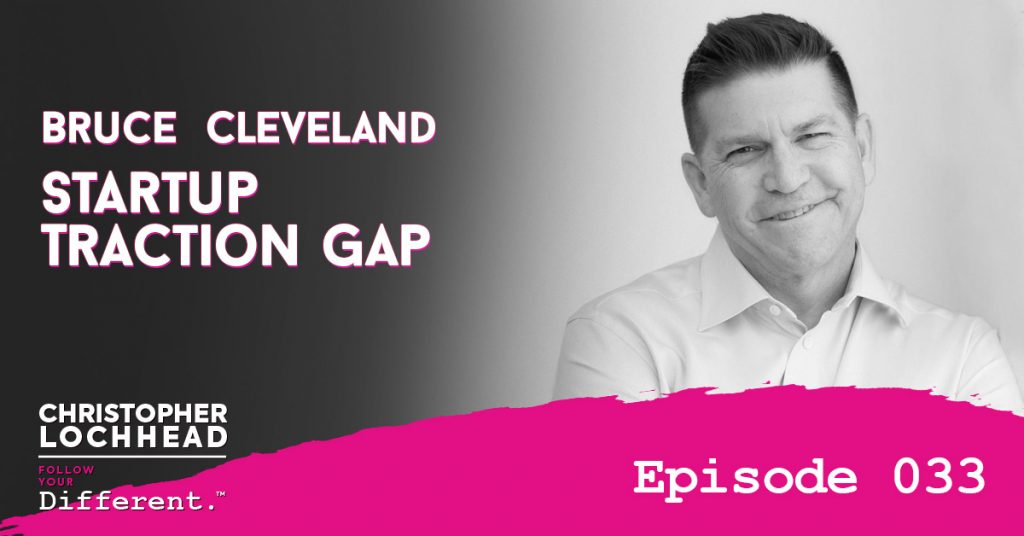
Why do most startups fail? Today, Bruce Cleveland joins us for a master class in building a massively successful B2B and why market engineering is a skill every executive needs. Listen in to learn how you can build your company and category to scale.
“Venture capital is a fairly interesting term or phrase. Because what I found is that there’s not a lot of venture in venture capital.” – Bruce Cleveland
Basic Patterns to Engineer Success
CEOs demonstrate basic patterns in engineering their success. But a lot of startups are not executing these patterns. Over the course of a decade in his prior firm, Bruce began to see which teams would have an actual chance for success.
He decided to explore these patterns, and he discovered three phases that every startup goes through. Even a new product offering in a large company will have to go through these same phases.
Go-to-Product and Go-to-Scale Phases
The first phase is the go-to-product phase. It begins with an idea, one that is hopefully informed by research. In this phase, you will have a prototype that you put in the market for some customers to get and provide feedback for in order to reach a more polished version called minimum viable product.
Skipping to the third phase, which is the go-to-scale phase, is where you finally get some customers and things are really working. Now, you have converted from being a PowerPoint company to a spreadsheet company. And you can finally show how good your product actually is.
Investors Look for Traction
Beyond reaching profitability, what most firms want to see is this thing called traction. They want to see demonstrable evidence that there’s a market and that people will purchase your product. And most of all, it needs to be enough evidence.
“That go-to-scale phase, there’s a lot of companies that will finance that. And there’s a lot of great brands that are out there that wait until you get to that point before they will invest in you.” – Bruce Cleveland
To learn more about the traction gap from Bruce, download and listen to the episode.
Bio:
Bruce Cleveland is a Founding Partner at Wildcat where he focuses on investments in artificial intelligence (AI) marketing, EdTech, enterprise software as a service (SaaS) and the Internet of Things (IoT). He’s also the author of Traversing the Traction Gap.
His specific areas of interest include enterprise automation, education and training, and general business applications. Bruce likes working with early-stage companies that use technology and data to increase revenue and decrease costs.
An avid adventurer and sailor, Bruce enjoys the challenge of creating new companies and navigating new markets.
Bruce began his venture capital career at InterWest Partners, where he was the first investor and a former board member of Marketo, which held an IPO in 2013 and was acquired by Vista Equity Partners in 2016 for $1.8 billion.
Links:
Wildcat Venture Partners – Traction Gap
We hope you enjoyed Bruce Cleveland on this episode of Follow Your Different™! Christopher loves hearing from his listeners. Feel free to email him, connect on Facebook, Twitter, Instagram and subscribe on iTunes!
032 Experiences w/ Joe Pine
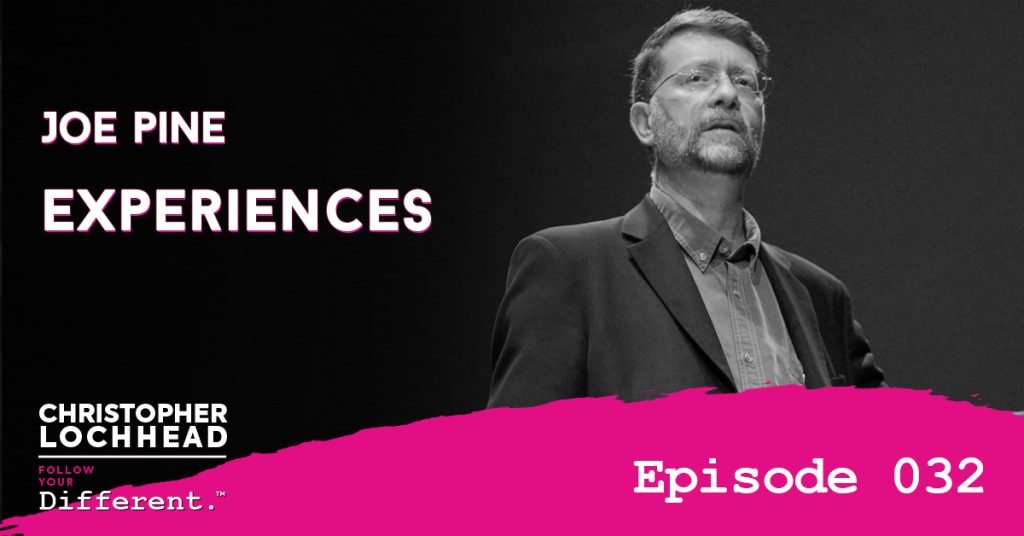
Are you a company people spend time with or save time with? On today’s episode, business thought leader Joe Pine joins us for a riveting conversation on why experiences remain important in the business sphere.
Progression of Economic Value
Joe and his partner opened their legendary book, The Experience Economy, with an anecdote on coffee beans. Coffee is a commodity that can be grown on the ground and a cup can cost 2 to 3 cents. But when you package coffee beans and sell them in stores, their value increases to 5 or 10 cents.
Even more, when you buy coffee from someone who brewed it for you, the cost increases to half a dollar. Finally, having coffee in an ambient environment like most coffee shops will have you paying up to $4 for a cup. This perfectly exemplifies the progression of economic value.“
When Companies Fail
Apple and Starbucks have succeeded in making experience part of their products through their retail stores. This is something that a lot of companies fall short in. Take for example Toys R Us, which went bankrupt recently.
“When you combine the great products that Apple has with the great experience they have in their stores, that’s when magic can happen.” – Joe Pine
Toys are the most experiential products in the world, even more than smartphones. But Toys R Us failed to see that putting them in a warehouse where kids couldn’t really play with them put their business in jeopardy.
Two Experience Strategies
As a company, you can choose between two strategies to make the customer experience better: the time well-saved strategy or the time well-spent strategy.
For the first one, you can divide the best possible service at the lowest possible price at the greatest possible experience for your customers. Meanwhile, there is also the second strategy where people actually value the time they spend with you.
“You gotta get people to value the time that they spend with you. Give them a reason to come into the store. Give them a reason to interact with you.” – Joe Pine
To hear about the four types of experiences and the value of being authentic from Joe, download and listen to the episode.
Bio:
Joe Pine is a legitimate business thought leader and among the founders of the experience economy. He and his partner James H. Gilmore wrote The Experience Economy: Work is a Theatre & Every Business a Stage in 1999, which demonstrates how goods and services are no longer enough. What companies must offer are experiences that engage each customer in an inherently personal way.
He helps clients to design strategies to leverage these new economic opportunities and create experiences that drive revenue.
Links:
Harvard Business Review – Welcome to the Experience Economy
We hope you enjoyed Joe Pine on this episode of Follow Your Different™! Christopher loves hearing from his listeners. Feel free to email him, connect on Facebook, Twitter, Instagram and subscribe on iTunes!
031 Men’s Athleisure w/ Vuori Founder Joe Kudla
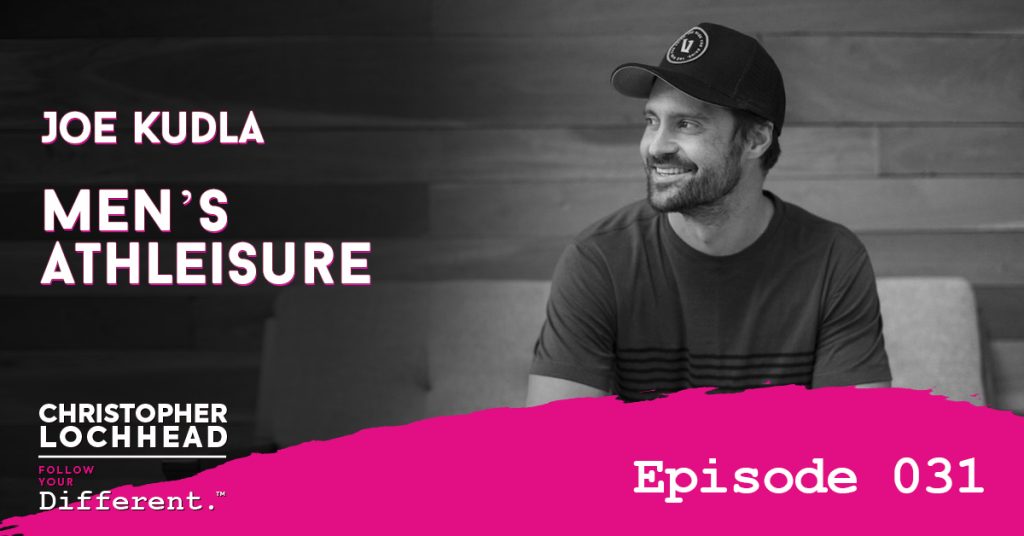
How do you bootstrap your way to success? On this episode, Joe Kudla joins us for a conversation on taking action based on insight. How do you design a new athletic clothing niche for men and be known in a category so large?
“I’ll be totally candid. I had no idea what it took to run a successful apparel business.“ – Joe Kudla
A Very Personal Brand
Athletic apparel has been around pretty much since the creation of the fig leaf. So why did Joe think of building a brand in this particular niche? It started out of a personal need.
Joe was an athlete who would beat himself up playing football his whole life. About ten years ago, he began dealing with a lot of back pain. That was when one of his friends suggested that he do yoga.
Beyond the Mass Produced
He was taking yoga classes daily when he looked around and realized that he never got to know what dudes are supposed to wear to yoga. It was this question, this puzzle, that set him and his associates to this whole path.
Massive brands flood the athletic apparel market. Some have buckled up the channel with better material and construction and more tailored, modern fit. But Joe wanted more than apparel exclusive for the gym.
“We’re the anti-gym guys. We’re going to the gym but we just didn’t connect with that culture around it.” – Joe Kudla
Creating Diverse and Versatile Athleisure
Joe looked at the space and came across the stats of people practicing yoga versus those who go surfing and gained valuable insight.
“When I really looked at the brand that we were gonna create, it was inspired by much more than yoga. It extended to this diverse, versatile active life.” – Joe Kudla
No one can deny the appeal of premium active apparel that performs better. But even better are clothes you can sweat in and wear to the beach or when you meet a friend for some beer. And so he built a brand that is casual and can be carried around throughout the day.
To hear more about the inception of Vuori and the story of finding love in poop from Joe, download and listen to the episode.
Bio:
Joe is the founder/CEO of Vuori is an active lifestyle apparel brand that draws inspiration from the aspirational coastal California lifestyle, an integration of yoga, surf, sport, art, and a strong visionary spirit.
Vuori makes products that stand the test of time and hopes to inspire others to be healthy, vibrant and live their dreams.
Links:
We hope you enjoyed Joe Kudla on this episode of Follow Your Different™! Christopher loves hearing from his listeners. Feel free to email him, connect on Facebook, Twitter, Instagram and subscribe on iTunes!
025 Courage to be Different w/ Vineet Jain, Founder/CEO Egnyte
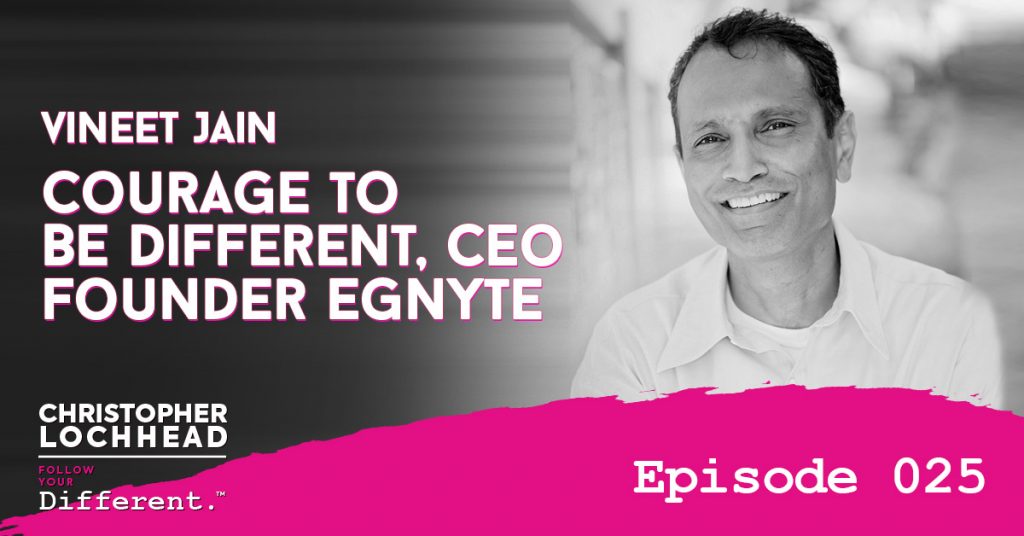
How do you carve out a counter-intuitive niche and be successful at it? On today’s episode, Vineet Jain joins us for a discussion about how he charted a path different from every other tech person’s. He also shares how it all paid off, ten years later.
Swimming Upstream to Grow
Vineet has built a business that has seen nine consecutive quarters of records. They did this against a landscape of massive competitors who at one time looked like they might really threaten Egnyte. And to achieve this, they had to niche down.
“Indeed, this company of ours has grown in the big shadow being cast by some of the players who had a lot more funding.” – Vineet Jain
Financing Against the Trend
Year over year, Egnyte had a compounded growth rate of 30-35% and wasn’t raising much money. It wasn’t until the fourth quarter of 2016 that their cash flow turned positive. But Vineet knew that this wasn’t enough to keep the company afloat.
In August of 2018, he pitched that they raised financing. This was despite the general trend that tech companies observed. Sure enough, Vineet’s confident promise was met, and Goldman Sacks came into the picture.
Divine Luck and Difference
Egnyte had a size disadvantage against other companies in their category. They had a little over 600 employees, so they had to figure out how to play to this asymmetry. Ultimately, they decided to focus on their product and the economics of customer acquisition.
“You cannot pick a fight with an enemy who has picked your weapon of choice.” – Vineet Jain
Even with how they tried to show how they were different, they didn’t escape being lumped with 100 other vendors. But the confluence of two factors helped them rise: the expansion of the category they belonged to and the adoption curve becoming mainstream. With a product that fit the market at an interesting period, they got higher demand.
To hear more about how Vineet worked to build Egnyte to reach its pre-eminence and raised a $75M-funding round, download and listen to the episode.
Bio:
Vineet Jain is the CEO and co-founder of Egnyte.
Prior to Egnyte, Vineet founded and successfully built Valdero, a supply chain software solution provider, funded by KPCB, MDV and Trinity Ventures.
He has held a rich variety of senior operational positions at KPMG and Bechtel. He has 20 years of experience in building capital-efficient and nimble organizations. Vineet earned a BS in Engineering from Delhi College of Engineering and received an MBA from Santa Clara University.
Links:
We hope you enjoyed Vineet Jain on this episode of Follow Your Different™! Christopher loves hearing from his listeners. Feel free to email him, connect on Facebook, Twitter, Instagram and subscribe on iTunes!
021 Q&A with Lochhead
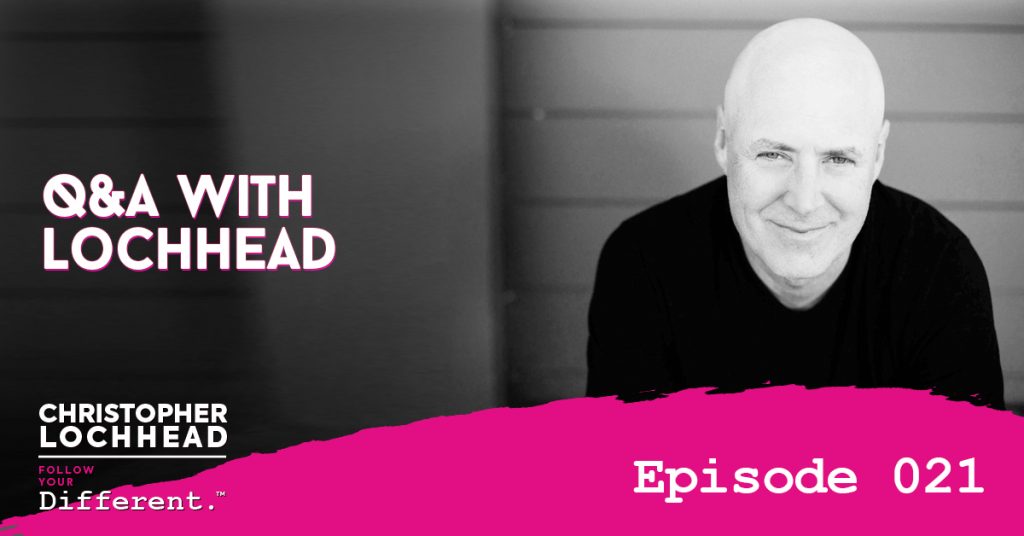
Podcast: Play in new window | Download (Duration: 8:41 — 8.1MB) | Embed
Subscribe: Apple Podcasts | Spotify | Pandora | RSS | More
How do you know when to quit? Is there still a place for creative minds in the marketing industry? On today’s Q&A with Lochhead, Christopher answers these two questions sent by his listeners.
Category Leaders’ Share
Should you quit a company that’s starting to fail at the category king game? In writing Play Bigger, Christopher and his co-authors conducted a research project where they analyzed every venture-backed company found in Silicon Valley from 2000-2015. They tracked how these companies grew in value.
They looked into the data for an answer to an important question. What percentage of the market cap goes to the category leader? It turned out that the number was a whopping 76%.
Winner Takes All
In businesses today, there exists a winner takes all game. And you would want to be part of that company. It’s a bitter pill to swallow.
We learn so much by winning. There is also the halo effect that comes from being part of a legendary team, and these halos last forever. Christopher would know.
“The minute that you think your company can’t win the category king or queen game in your space, that’s when you need to start looking.” – Christopher Lochhead
When considering companies, you must also ask yourself these important questions: Can this company do product, company, and category design right? And can you make a contribution to that?
Creativity in Marketing
How about people who want to live off creative work in marketing? Is creativity still a fundamental asset in this landscape?
In business today, data and technicals are becoming increasingly important. Even so, creativity still comprises half the work in marketing, especially concerning new skills that companies require in new CMOs.
“Category design is now the number one skill that CEOs are looking for when they are recruiting new CMOs.” – Christopher Lochhead
To hear more about the role of creativity in the marketing landscape, download the listen to the episode.
Links:
Harvard Business Review Article – How Unicorns Grow
We hope you enjoyed this Q&A with Lochhead
020 Conversational Marketing, Category Design & More w/ David Cancel
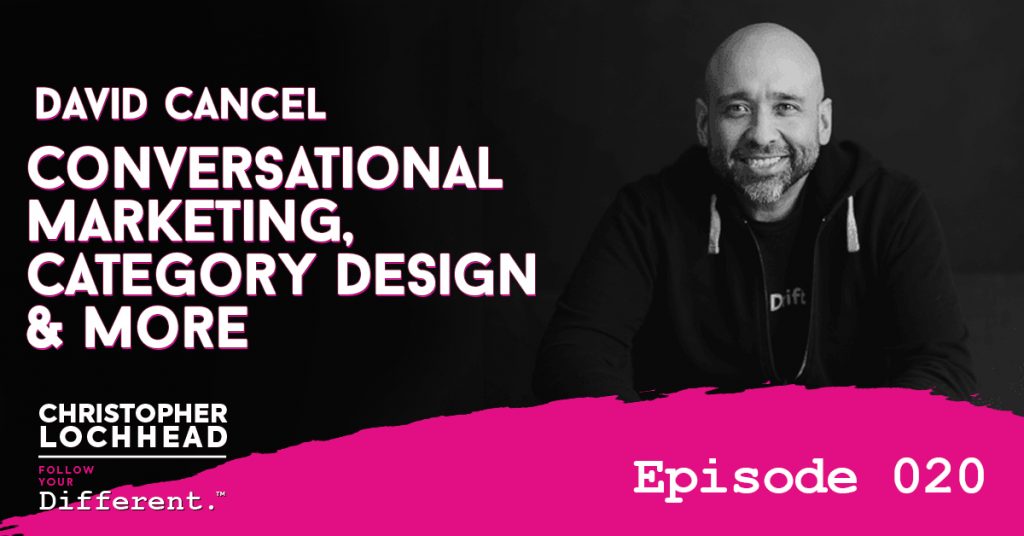
Podcast: Play in new window | Download (Duration: 57:42 — 53.0MB) | Embed
Subscribe: Apple Podcasts | Spotify | Pandora | RSS | More
Why is it even more important now to focus on customers? Today, David Cancel joins his friend Christopher to talk about personal brands and authenticity. They also have an insightful discussion about designing a new category of conversational marketing.
Reputation Before Personal Brand
Everybody seems to be scrambling to become influencers these days. But too often, people fall for the false promises of contrived personal branding. They need to learn the distinction between a personal brand and reputation.
“A reputation starts with ‘carrying the water’, doing the work, producing the results… Becoming a person of substance that can be relied upon to produce results.” – Christopher Lochhead
With a reputation, people would turn to you and know you for your personal brand. But first, you need to have done something repeatedly you will be known for. And only then can you be authentic.
“You wanna learn from the athlete, you wanna learn from the entrepreneur, you wanna learn from whoever that has repeatedly done something—not that they did something one time.” – David Cancel
Big Changes, Infinite Supply
David built Drift with the idea that people have been taught to do certain things that no longer exist. He also had a career centered around the idea that companies have all the control over their offers.
But this setup has become obsolete with the infinite supply of everything in every category. In effect, the customer has a lot more options.
Designing a New Category
After reading Play Bigger, David realized the importance of category design in linking their company’s vision and desired results. They needed to drive back to people and customers. And so they designed a category around conversational marketing.
They aim to espouse the strategy of making customers feel special while delivering what they wanted.
“This is the larger change that we believe is gonna happen in the world, where the customer has control.” – David Cancel
To hear more about conversational marketing, chatbots, and category design from David, download and listen to the episode.
Bio:
David Cancel is a serial entrepreneur, podcast host (Seeking Wisdom) and angel investor/advisor. He created hypergrowth companies, products and product teams at companies such as Drift.com, HubSpot, Performable, Ghostery and Compete.
David has been featured by media outlets such as The New York Times, Forbes, Fortune, Wired and Fast Company. David has also guest lectured on entrepreneurship at Harvard, Harvard Business School, MIT, MIT’s Sloan School of Management, Bentley and other Universities.
His popular blog DavidCancel.com has been read by 1M+ entrepreneurs, and his Twitter account @dcancel has 180k followers and is considered a “Must-Follow” account for entrepreneurs, executives, and product people.
Links:
Website – Seeking Wisdom Podcast
iTunes – Seeking Wisdom Podcast
Amazon – Conversational Marketing
We hope you enjoyed David Cancel on this episode of Follow Your Different™! Christopher loves hearing from his listeners. Feel free to email him, connect on Facebook, Twitter, Instagram and subscribe on iTunes!
013: Quit Your Corporate Job & Go Solo w/ Eddie Yoon
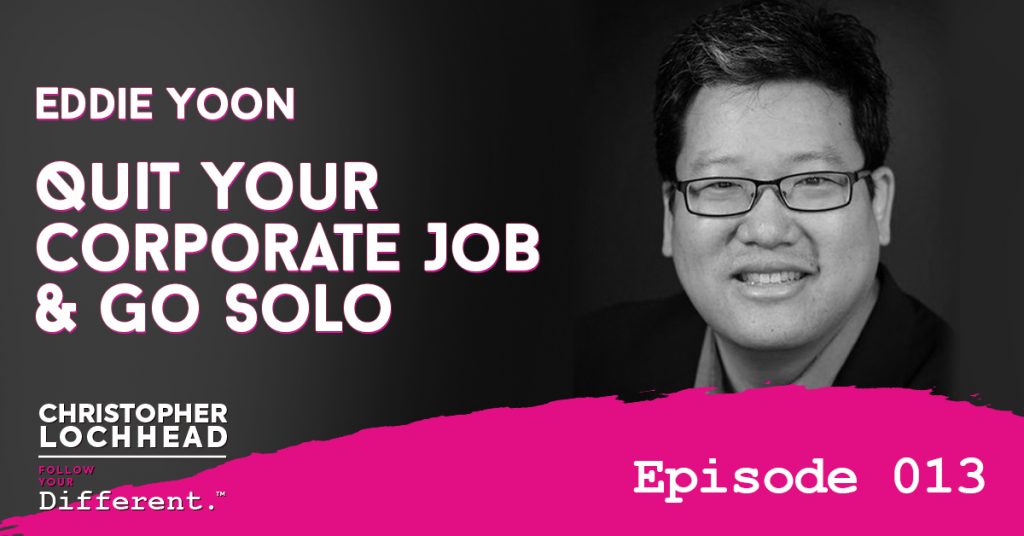
Podcast: Play in new window | Download (Duration: 1:07:41 — 62.1MB) | Embed
Subscribe: Apple Podcasts | Spotify | Pandora | RSS | More
Today, Eddie Yoon unpacks a recent Harvard Business Review article with his co-author Christopher. Together, they answer some questions, concerns, and explain further why you should quit your corporate job and go solo.
It’s All in the Data
Eddie and Christopher’s HBR article has been receiving a lot of attention. Some of the people amid the buzz expressed their concerns about their thesis. But the data say it all: nearly 70% of solopreneurs make $100,000-250,000 in a year.
This figure is almost twice as much as the average US household. And it is much higher than what Glassdoor reports the average US executive makes yearly—$121,500. It seems solopreneurs are doing as well, if not exceedingly better, than most executives.
“If solopreneur was an industry and a company, everyone would be flocking to this industry in the same way that people did it for Silicon Valley or investment banking or consulting.” – Eddie Yoon
Importance of IPOs
Initial public offering (IPOs) have always been tech-related. But there are notable people who have done it in a non-digitized fashion. One example is Steve Hughes who launched a special purpose acquisition company and eventually skyrocketed as a solopreneur.
To go solo, a bridge needs to be crossed. You must know your investor story and who your target investors are. You must also know why they should believe that you’re worthy of your multiple.
“I think that more people are figuring out that market exists and [so], ‘Why not me?’” – Eddie Yoon
Breaking Out to Do Better
So many people are afraid to break out because of the corporate mothership and the financial aspect tied to the choice. But there are those who confronted their fear of not making enough and ended up earning more while working less.
The other odd benefit to going solo is that as an outsider, solopreneurs tend to be a lot smarter than those who are tied to a company.
“Maybe that’s the extra value that perspective gives you.” – Eddie Yoon
To hear more about the ultimate way of monetizing yourself and making an emotional business case for going solo, download and listen to the episode.
Bio:
Eddie Yoon is the founder of EddieWouldGrow, LLC a think tank and advisory firm on growth strategy.
Prior to this, he was a partner at The Cambridge Group, a strategy consulting firm that helps Fortune 500 CEOs drive growth by unlocking consumer demand. His work over the past two decades has driven over $5 billion dollar of annual profitable growth in consumer packaged goods, durables, robotics and energy.
Eddie is one of the world’s leading experts on finding and monetizing superconsumers to grow and create new categories. He is the author of the acclaimed book, Superconsumers: A Simple, Speedy and Sustainable Path to Superior Growth (Harvard Business School Press, 2016).
He is also the author of over 40 articles, including Make Your Best Customers Even Better (Harvard Business Review magazine, March 2014) and Why It Pays to Be a Category Creator (Harvard Business Review magazine, March 2013). Additionally, he has been quoted in the Wall Street Journal, The Economist, Forbes and has been a keynote speaker in the U.S., Canada, Kenya, Australia, New Zealand, Denmark, the UK and Japan.
Eddie lives in Chicago with his wife and three children.
Links:
Harvard Business Review Article by Eddie Yoon & Christopher Lochhead:
Glassdoor – Executive Salaries
We hope you enjoyed Eddie Yoon on this episode of Follow Your Different™! Christopher loves hearing from his listeners. Feel free to email him, connect on Facebook, Twitter, Instagram and subscribe on iTunes!

